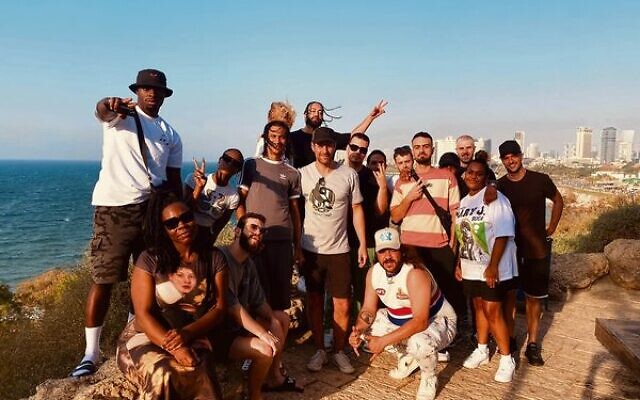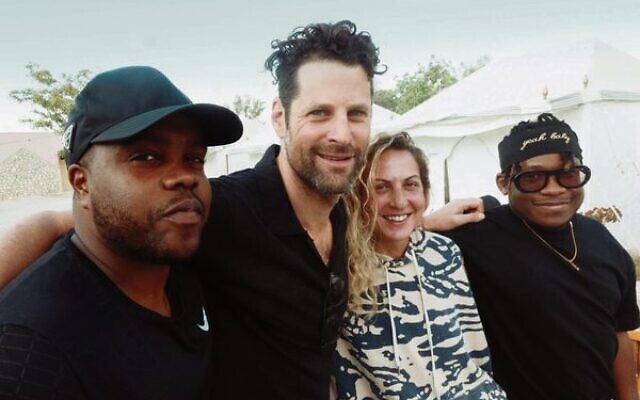WHEN more than 35 musicians, comedians and productions – including Indigenous dance company Marrugeku, and First Nations rapper Barkaa – withdrew from the January 2022 Sydney Festival as part of a BDS-inspired boycott, it understandably deeply shocked the Australian Jewish community.
The boycott was in protest of the festival securing a $20,000 grant from the Israeli embassy towards the cost of staging renowned Israeli dance production Decadance.
The group behind the boycott had written to the festival’s board, claiming that its decision would make it “unsafe” for artists of Arab background, and boycott co-organiser Fahad Ali even went as far as telling the Sydney Morning Herald that the festival’s board “was continuing to invest in apartheid in the Middle East”.
While Decadance was performed, receiving rave reviews, the level of anti-Israel vitriol proliferated by the boycott leaders to both Australian and overseas-based performing artists – and the pressure placed on them all, took its toll.
Eight months later, Sydney Festival chair David Kirk announced that all future funding grants towards the festival from foreign governments would be suspended; the first time that has happened since the annual event began in 1977.
The boycott particularly stung Dan Rosen – president of Warner Music Australasia, and a former CEO of ARIA (the Australian Recording Industry Association).

He felt compelled to do something impactful to help prevent it happening again, particularly for Indigenous Australian performing artists, and artists from overseas who are black, or are people of colour, who may consider performing in festivals in Australia in the future.
After arranging an open letter against the boycott to be signed by 120 other global entertainment industry leaders, through Creative Community for Peace, Rosen began speaking with community groups about what could be done, and came up with an action plan to create a hip hop, rap and R&B artists’ creative mission to Israel.
It was called “Let the Music Play”, and 20 participants embarked on its inaugural trip to Israel from late October to early November last year.
“I’ve always thought that the best disinfectant [for BDS] is the truth, and the best way to provide the truth is to get people to Israel, to actually see the country and the situation for themselves,” Rosen said last week.
“So Let the Music Play was inspired by seeing the reaction during the 2022 Sydney Festival boycott, and the many misunderstandings within the artists’ community about Israel that became apparent.
“In particular, the narrative pushed by the boycott’s leaders – that Indigenous Australians should stand with the Palestinian cause because Palestinians are the indigenous people of Israel and the Jews are not. This narrative had started to gather momentum within the artistic community at a scale that I hadn’t previously seen before.
“I am all about using music to connect people, instead of using it as a means of division.” Markell Casey
“And that was very troubling, firstly because it is false, and second, given how important it is for our community, and for all Australians, to have a positive relationship with First Nations Australians.
“Israel is not perfect, but I don’t want to live in a country where the Indigenous people of Australia think that the Jewish people in Israel are colonial settlers and do not have a thousands-of-years-old connection to the land … that’s not a society that we want to live in.
“I also had the feeling [during the festival] that the Jewish community felt a little flat-footed, potentially, about how we deal with this situation.”
Rosen explained how understanding what makes musicians and artists tick was the key to designing a mission to Israel that would resonate most for the group, which included eight BIPOC (Black, Indigenous, People of Colour) Australian rappers, singers and producers and eight artists and producers of colour from the UK.
“So the idea that was sparked was to design a trip that was not about sight-seeing but one in which they could come to Israel to actually create and write music, and meet local Israeli artists and producers and collaborate with them.
“Because that’s what artists want to do – create. They let the environment, the history and the situation, inform and infuse them, and go into their creativity zone, and I think that’s what really appealed to them, and opened up different conversations and opportunities.”
Upon presenting the idea to some communal leaders, it clicked quickly, and working with co-CEO of the Executive Council of Australian Jewry Alex Ryvchin, base funding was found.
“Then I was able to get some sponsorship for it in Israel as well, from a hotel group called Selina that just launched on the NASDAQ and is based very much around the concept of building creative communities, and also from Live Nation Israel – one of the big touring promoters over there – to help pull this together.”

Four Israeli artists and music producers also came on board, including a black, African-born, Christian rapper and Ethiopian Jewish rappers.
Rosen is very thankful for the behind-the-scenes support for the mission from Ryvchin, and particularly UK-born music industry executive Markell Casey, who now resides in Los Angeles, but lived in Australia recently when he was Sony Music Australia’s senior director of artists and repertoire.
“Markell, who had been to Israel previously, joined the mission, and was my key frontman and partner in making it happen, because he could see the talent in the group, and what could be created.”
Reflecting on the mission four months on, Rosen described it as “absolutely incredible” and something he feels very proud of, for all involved.
The first five days were based in Tel Aviv, where an entire floor of a Selina hotel by the beach was booked, so that mini music studios could be set up in the hotel rooms for the participants.
“They spent their days in Tel Aviv working – writing music and lyrics – and then each night we [Rosen and Casey] would take them out for dinners, and cultural experiences in Tel Aviv and Jaffa, and introduce them to local artists, to immerse themselves in the Israeli music scene,” Rosen said.
“We then had a day trip to Jerusalem, including a visit to the Old City and Western Wall, which to me was the most fascinating part to observe, because – particularly for some of the Indigenous Australian artists who were raised as devout Christians – to be in the Holy Land was something they, and their families, never thought was possible.
“So that was a very special and powerful experience for them. It was like the places and stories from the Bible had come to life.”
The remainder of the trip included a drive, via the Dead Sea, to the beautiful Mitzpe Ramon crater in the Negev desert, where they slept in tents beneath the stars, and continued to work on writing music by day, no doubt inspired by their surroundings.
“You could just see how they started feeling that Israel is actually a bit magical. I mean, you can float on water!
“The other thing that struck the group – particularly the Indigenous participants who grew up in remote and vast areas of the Kimberley or in far north Queensland – was just how tiny Israel is. You can drive for less than an hour and see completely different landscapes, from hills, to waterways, to deserts.
“They wrote and recorded a lot of music on the mission, and met and worked with Israeli artists, and I think their experiences will impact their writing now, and in years to come.
“And for me personally – as someone to whom Israel is obviously so special – the most powerful thing was seeing Israel anew … fresh through somebody else’s eyes.
“As musicians, they naturally were able to pick up on the energy of the place, and seeing how it impacted on them was very special, and even more profound than I’d thought it was going to be.”
Asked if he was confident, given the mission’s success, that it could become an annual event, Rosen said “absolutely”.
“So that was a very special and powerful experience for them. It was like the places and stories from the Bible had come to life.” Dan Rosen
“I hope it is something that we can continue to do, and I think the more BIPOC artists we can take to Israel the better, and in the future, hopefully expand the program to include people from other creative arts, like painters and writers.
“By experiencing Israel, they can then come up with their own understanding of what Israel is, and recognise that it is certainly more profound, complex and amazing, than they’re being told.”
Like Rosen, Casey was one of the 120 music and entertainment industry leaders who signed the Creative Community for Peace’s open letter that condemned the 2022 Sydney Festival boycott organisers and supporters.
For his part, Casey – who is the son of a pastor – told The AJN from Los Angeles last week that he was motivated to make such a hands-on contribution to the inaugural mission for several reasons.
But the top one was because, “I am all about using music to connect people, instead of using it as a means of division.
“Dan and I had connected via some of the work we do in the community, particularly around the issue of antisemitism in the music business,” Casey said.
“For as long as I can remember, people I’ve met over the years have expressed casually racist anti-Jewish sentiments, particularly in relation to Jews and Israel.
“Having been to Israel myself, I felt that it was important [for musicians] to see and experience the diversity in Israel, especially in the people, food, religion and the myriad of unsolicited opinions that Israelis are more than happy to share with you … it’s never dull.
“I also felt that it would be a unique experience to make music in Israel, and so it proved.”
Casey said that in terms of feedback received by participants, “the overwhelming sentiment was one of deep gratitude for this once-in-a-lifetime experience”, and he felt that the objectives of the mission were achieved.
“From the outset, the aim was to curate an experience where talented artists can create in a unique – and from my opinion, a very special – environment.
“Israel has many challenges and is by no means a perfect country, but there isn’t a single perfect country in the world.


comments